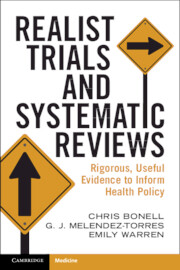Book contents
- Realist Trials and Systematic Reviews
- Reviews
- Realist Trials and Systematic Reviews
- Copyright page
- Contents
- Figures
- Tables
- Boxes
- Acknowledgements
- Chapter 1 Introduction
- Chapter 2 Why Are Trials and Systematic Reviews Necessary but Currently Insufficient to Inform Health Policy?
- Chapter 3 Realist Critiques and Manifesto for Evaluation and Reviews
- Chapter 4 Building Realist Theory in Evaluations
- Chapter 5 Refining Realist Theory through Process Evaluations
- Chapter 6 Testing Realist Theory through Trials or Other Evaluation Designs
- Chapter 7 Building and Refining Realist Theory in Systematic Reviews
- Chapter 8 Testing Realist Theory through Synthesising Outcome Evaluations
- Chapter 9 Using Evidence to Inform Intervention Scale-Up and Transfer
- Chapter 10 Using Evidence to Refine Middle Range Theory
- Conclusion
- References
- Index
Chapter 8 - Testing Realist Theory through Synthesising Outcome Evaluations
Published online by Cambridge University Press: 08 February 2024
- Realist Trials and Systematic Reviews
- Reviews
- Realist Trials and Systematic Reviews
- Copyright page
- Contents
- Figures
- Tables
- Boxes
- Acknowledgements
- Chapter 1 Introduction
- Chapter 2 Why Are Trials and Systematic Reviews Necessary but Currently Insufficient to Inform Health Policy?
- Chapter 3 Realist Critiques and Manifesto for Evaluation and Reviews
- Chapter 4 Building Realist Theory in Evaluations
- Chapter 5 Refining Realist Theory through Process Evaluations
- Chapter 6 Testing Realist Theory through Trials or Other Evaluation Designs
- Chapter 7 Building and Refining Realist Theory in Systematic Reviews
- Chapter 8 Testing Realist Theory through Synthesising Outcome Evaluations
- Chapter 9 Using Evidence to Inform Intervention Scale-Up and Transfer
- Chapter 10 Using Evidence to Refine Middle Range Theory
- Conclusion
- References
- Index
Summary
This chapter examines how context–mechanism–outcome configurations (CMOCs) can be assessed within systematic reviews, again using the example of a review of school-based prevention of dating and other gender-based violence. Rather than testing CMOCs by assessing whether these align with the narratives reported by included studies, realistic systematic reviews assess and refine CMOCs by assessing how they compare with the statistical regularities reported by included studies. Overall meta-analyses indicate overall effects. Network meta-analyses shed light on how different intervention components might enable generation of outcomes. Narrative syntheses of mediation and moderation analyses and meta-regression suggest how mechanisms might work and how these may generate different outcomes in different contexts. Qualitative comparative analyses examine whether more complex combinations of markers of context and mechanism co-occur with markers of outcome. These analyses can provide nuanced and rigorous information on which CMOCs appear to explain how intervention mechanisms interact with context to generate outcomes. A limitation of assessing CMOCs in systematic reviews rather than primary intervention studies is that the analyst has less control over what empirical analyses are possible so analyses tend to be more inductive.
Keywords
- Type
- Chapter
- Information
- Realist Trials and Systematic ReviewsRigorous, Useful Evidence to Inform Health Policy, pp. 73 - 81Publisher: Cambridge University PressPrint publication year: 2024



